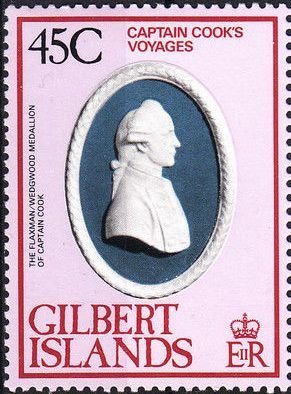Stamp: Capt. Cook (Gilbert Islands 1979)
Capt. Cook (Gilbert Islands 1979)
15 January (Gilbert Islands ) within release Capt. Cook’s voyages goes into circulation Stamp Capt. Cook face value 45 Australian cent
| Stamp Capt. Cook in catalogues | |
|---|---|
| Michel: | Mi:GB-GI 321 |
| Stamp Number: | Sn:GB-GI 324 |
| Yvert et Tellier: | Yt:GB-GI 74 |
Stamp is square format.
Also in the issue Capt. Cook’s voyages:
- Stamp - Endeavour face value 10;
- Stamp - Green turtle. face value 20;
- Stamp - Quadrant. face value 25;
- Stamp - Capt. Cook face value 45;
Stamp Capt. Cook it reflects the thematic directions:
Art is a diverse range of human activities in creating visual, auditory or performing artifacts (artworks), expressing the author's imaginative or technical skill, intended to be appreciated for their beauty or emotional power. In their most general form these activities include the production of works of art, the criticism of art, the study of the history of art, and the aesthetic dissemination of art. The oldest documented forms of art are visual arts, which include creation of images or objects in fields including painting, sculpture, printmaking, photography, and other visual media. Architecture is often included as one of the visual arts; however, like the decorative arts, or advertising, it involves the creation of objects where the practical considerations of use are essential—in a way that they usually are not in a painting, for example. Music, theatre, film, dance, and other performing arts, as well as literature and other media such as interactive media, are included in a broader definition of art or the arts. Until the 17th century, art referred to any skill or mastery and was not differentiated from crafts or sciences. In modern usage after the 17th century, where aesthetic considerations are paramount, the fine arts are separated and distinguished from acquired skills in general, such as the decorative or applied arts.
Famous People refers to the fame and public attention accorded by the mass media to individuals or groups or, occasionally, animals, but is usually applied to the persons or groups of people (celebrity couples, families, etc.) themselves who receive such a status of fame and attention. Celebrity status is often associated with wealth (commonly referred to as fame and fortune), while fame often provides opportunities to make money.
A navigator is the person on board a ship or aircraft responsible for its navigation. The navigator's primary responsibility is to be aware of ship or aircraft position at all times. Responsibilities include planning the journey, advising the ship's captain or aircraft commander of estimated timing to destinations while en route, and ensuring hazards are avoided. The navigator is in charge of maintaining the aircraft or ship's nautical charts, nautical publications, and navigational equipment, and they generally have responsibility for meteorological equipment and communications. With the advent of satellite navigation, the effort required to accurately determine one's position has decreased by orders of magnitude, so the entire field has experienced a revolutionary transition since the 1990s with traditional navigation tasks, like performing celestial navigation, being used less frequently. Using multiple independent position fix methods without solely relying on electronic systems subject to failure helps the navigator detect errors. Professional mariners are still proficient in traditional piloting and celestial navigation.



